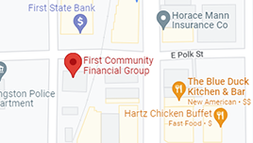First Community Financial Group, Inc. Blog |
|
Comprehensive vs. Collison Auto Insurance
Auto insurance is designed to provide you with financial assistance in the event of an accident, theft or other instance of vehicle damage. After all, you shouldn’t have to bear the costs of an accident entirely on your own. There are a few separate benefits that the average policy will utilize to cover vehicle damage. Two of these are collision coverage and comprehensive coverage. You have to understand that these are equally essential, but still unique and separate benefits. Here’s how they work. Collision Coverage Collision insurance is often the type of physical damage insurance that is most familiar to policyholders. It will help you cover costs to repair or replace your vehicle following a wreck. You can use this benefit when an accident is your fault, since under the circumstances you won’t be able to file against another at-fault party’s liability insurance. Typically, your collision coverage will pay for the cost of your repairs, minus the cost of a deductible. If the vehicle is totaled in the accident, then the policy will often pay the cash value of the car at the time of the loss, minus the deductible cost. This might not be the full cost necessary to buy a new car, but it will represent a settlement for the value of the vehicle lost. Factors like your chosen deductible, the value of your vehicle and your driving habits will influence the cost of your collision coverage and your overall premium. Plus, if you have a tarnished driving record, then you are likely to pay a higher premium overall because you have a higher likelihood (in the eyes of the insurer) of filing a damage claim. Comprehensive Coverage Aside from collision coverage, comprehensive coverage is a separate physical damage benefit that is designed to cover vehicle damage from hazards other than collisions. Unlike its name might suggest, it does not include collision coverage as part of its benefit. You must purchase these two benefits separately in order to get full coverage. There are many cases in which comprehensive coverage can pay for vehicle damage. For example, if a tree falls on your car during a storm, then this is the benefit that will pay for the repairs. If your car were to catch on fire (even while you are driving it), then this is another circumstance in which your plan will cover you. Considerations Physical damage insurance is not a benefit that any driver should be without, and it’s easy to see just how much assistance this plan can provide you in the event of vehicle damage. This coverage is so essential that many vehicle lenders will require drivers to purchase this coverage if they finance their car purchases. By having this coverage, you can better guarantee that you won’t default on your loan payments just because of damage to or loss of your vehicle. Contact one of our agents today to get a free quote for your auto, ATV, boat or RV!
0 Comments
Leave a Reply. |
Contact Us(936) 327-4364 Archives
July 2024
Categories
All
|

 RSS Feed
RSS Feed
